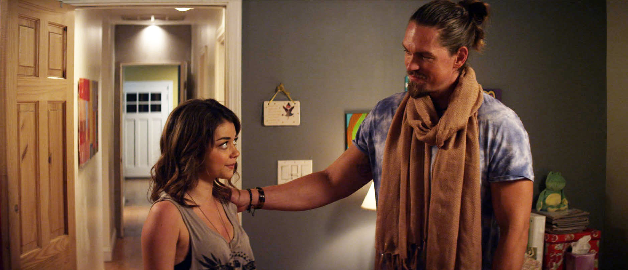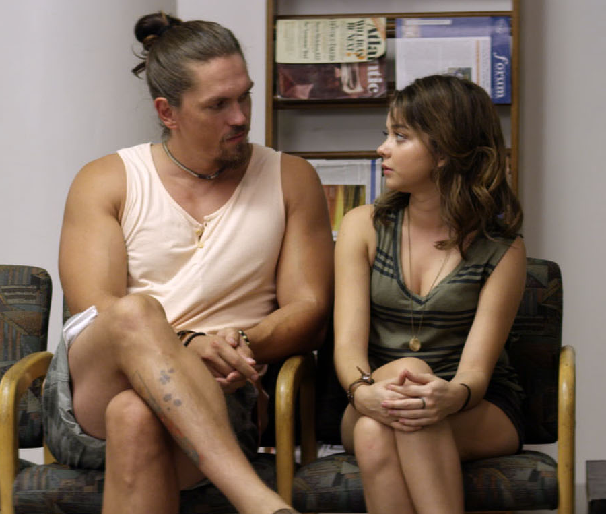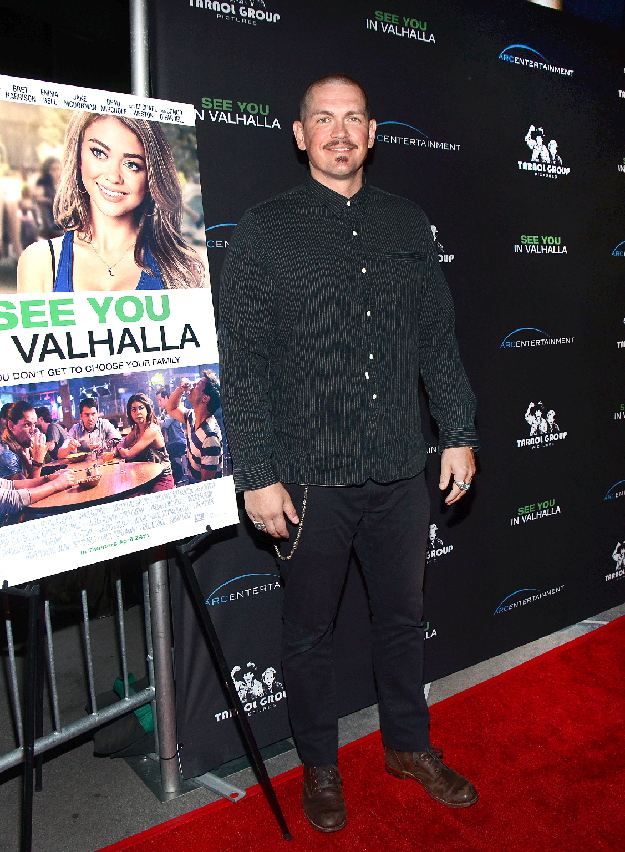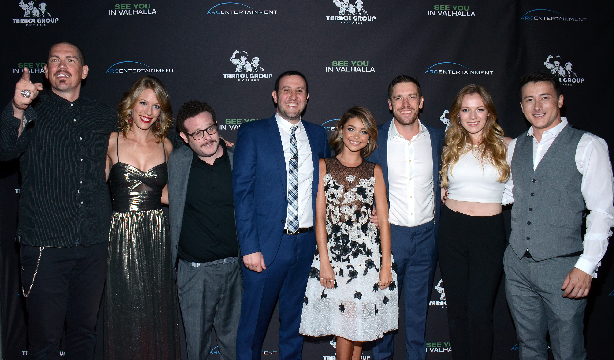Fearlessly approaching unfamiliar personal and professional relationships and situations, no matter how daunting they initially appear to be, is a positive and exhilarating process for anyone. That encouraging idea of courageously going after what you truly want, no matter what challenges you may be forced to overcome along the way, is one of the inspiring and relatable themes in the new independent comedy-drama, ‘See You in Valhalla.’ The film, which is now playing in theaters and on VOD and iTunes, was written by Brent Tarnol and directed by his brother, Jarret. While the story emphasizes the endurance the up-and-coming filmmakers infused into the process of making the comedy-drama, the performances by such actors as Steve Howey and Sarah Hyland highlight that no matter what emotional obstacles families are forced to overcome in their relationships, their undeniable love will help reinforce their bonds.
‘See You in Valhalla’ begins in the immediate aftermath of the mysterious suicide of misunderstood and soulful meth dealer-addict Maxwell “Magnus” Burwood (Jake McDorman), who’s obsessed with Viking culture. In an effort to reunite their family, his estranged siblings, who are joined by the people they care about who have stayed in their lives to support them, return to their childhood home. Led by their workaholic businessman father, Woody (Conor O’Farrell), the family tries to emotionally reunite, despite their differences and conflicts.
Magnus’ siblings include Johanna (Hyland), an artist who left town several years ago during a teen pregnancy with her high school boyfriend, Johnny (Beau Mirchoff). The two consider reuniting, despite the fact that she brought one of her neighbors, Peter (Alex Frost), who she’s been dating, home with her. Johanna also tries to reconnect with her two surviving older brothers-Barry (Bret Harrison), a gay psychologist with self-esteem issues, and the uptight Don (Michael Weston), who’s still contending with his younger siblings’ sexuality.
In his own effort to cope with Magnus’ death, Barry brings his intolerable, Republican teenage daughter, Ashley (Odeya Rush), home with him. Since she has non-existent relationships with their relatives, Ashley regularly clashes with them during their reunion, including her aunt and Barry’s boyfriend, the Hawaiian personal trainer, Makewi (Howey). While the siblings have long been kept separated by their differences, the group is collectively stunned by the fact that Woody, who’s a widower, has begun dating his new nurse, the young hippie Faye (Emma Bell). Despite their long-standing estrangement and disparities, the siblings and their father begin to once again love and appreciate each other, as they struggle to adapt to the new surprising changes in their respective lives.
Howey generously took the time recently to talk about filming ‘See You in Valhalla’ during an exclusive interview over the phone. Among other things, the actor discussed how he was drawn to portray Makewi in the comedy-drama, as he has never played a character like him before, and he gladly welcomes the opportunity to embody diverse roles that continuously challenge him as an actor; and how he enjoyed working with the cast and crew, particularly the writer, director and Harrison, as they all encouraged him to fully explore his character’s diverse emotions and distinct personality, and work outside his comfort zone.
ShockYa (SY): You play Makewi in the new comedy-drama, ‘See You in Valhalla.’ What was it about the character, as well as the script overall, that convinced you to take on the role?
Steve Howey (SH): (I wanted the chance to play) a gay Hawaiian. It sounds like a weird character description, and I didn’t know what it meant, so I questioned who he was at first. But I said, “Yes, I’ll do it.”
Jack Lemmon always took roles he didn’t know how to play, and he figured them out as he was filming. So growing up, I adhered to that same idea, as it stuck out to me. I went through a similar situation with Makewi, so I embraced that concept.
I started questioning the idea of playing a homosexual who’s Hawaiian; I thought, why can’t he just be a guy who lives in Hawaii? I’m a big white dude, and I’m not Hawaiian at all. (laughs) I don’t have a mix of Pacific Islander in my heritage.
There was nothing altruistic about my decision to play him-there was a selfish element of wanting to play this character. The film’s overall story didn’t even come in second in my decision to take on the role-it was more like the third or fourth reason.
SY: How did you build your on-screen relationships with the rest of the cast of ‘See You in Valhalla,’ particularly Bret Harrison, who played Barry? Were you able to have any rehearsal time together before you began filming, in order to talk about your characters’ history and backstory together?
SH: It was great, and a lot of fun to act alongside Bret. It’s really nice to work with people who are so well prepared and professional. A lot of times you’ll hear stories about what actors are really like, as being a performer comes with a lot of baggage.
But here’s a guy who’s really talented, funny and sweet. We had a lot of fun acting together. He wanted to play his character as being a little more real; he didn’t want to portray Barry as a flamboyant gay person. He allowed me to do that, which I thought was really cool. He said, “Let’s put different elements into our performances, so we’re not playing the same character.” So that process was a lot of fun.
I think my performance definitely came alive because of him. That’s what acting’s all about-I’m not doing this to have a terrible time. I want to have fun, and grow as a performer, as I’m acting.
The whole cast was great. Sarah Hyland, who starred in and produced the film, was wonderful the entire time. There’s not only talent on screen; there’s also talent working behind the scenes. You need amazing talent on and off screen to make a great film. The people who happen to be the most famous actors are also amazing in real life; talent is often parallel with people’s real personalities, and that’s what I got to experience on this film.
SY: While the film focuses on the emotional struggles the Burwood is experiencing in the wake of Magnus’ death, the family continuously relies on humor, that’s often targeted at each other, to make themselves feel better. Since the film incorporate that humor into its story, did you and the rest of the cast to improv at all?
SH: Well, we stuck to the script that Brent wrote, but he was very open to my viewpoints, which was very nice of him. He’s a new screenwriter, and since he’s young, I think he was trying to go outside of his comfort zone with this script, which was brave.
Did he miss some stuff? Yes. Did the story lag in some places? Sure. But he wrote a movie, which I think is a success in itself. There are some parts of the story that I think are a little dry and corny, which is why I wanted some of my stuff to be a little more flamboyant. I wanted my performance to have a flair, and let the humor come in. I was experimenting with this role. I’m a big guy, and am bigger than almost everyone else in the cast, but I played this flamboyant character who wears scarves. But I didn’t want the character to be clichéd or a caricature. I definitely wanted there to be a comedic element, and Brent and Jarret were very happy that I did it, and supportive of that process.
SY: Speaking of Jarret, what was your working relationship with him, particularly since he’s a relatively new filmmaker, as well?
SH: Working with Jarret was great. He is a new filmmaker, but he’s a very smart guy. He’s very aware of what’s going on, and he has common sense, which is a big part of filmmaking. Over the course of my career, I’ve worked with a lot of different directors on independent and studio television series and movies.
I found Jarret to be one of the most persoanble directors, and he always wanted to know what I thought. A lot of that had to do with him being new, and having a sense of naïveté, which was a good thing, because he was learning. He wanted the best performances from his actors, and he was trying to figure out what he could do to achieve that. I was really appreciate of that process, which comes from his own confidence. He’s going to continue gaining more confidence throughout his career, which is going to help him get better.
If this was their ‘Citizen Kane,’ there wouldn’t be a point in making another movie. But there were struggles and things that didn’t work on this film, and I think that’s great. There should be mistakes and things that are off-putting that you learn from. Otherwise, why do this? How do you grow from success? You don’t-you grow from mistakes and failures. Not that this film is a mistake or failure, but it’s not a perfect piece, and I think that’s great.
So Jarret was very accommodating. If I had an idea, he was willing to try it, which was cool. There weren’t any battles, and I liked that. But he was also determined to get across his point-of-view.
Since I’m older than he is, and I’ve been around longer in this industry than he has, but I still gave him the respect of being the captain of the ship. I kept telling him, “This is your ship, and you’re the captain. You have to tell people to either follow or get out of the way, and that’s it.” He did that, which was great.
SY: What was the process of filming the movie independently? Does that process help or hinder the creative process on this type of film overall?
SH: The independent filmmaking process does help a film’s creative process on a certain level. Every project’s different, and organically evolves into something that you didn’t anticipate.
Studio films are definitely by the book-everything’s go, go, go, and needing to get each shot. They have a bigger crew and longer set-ups, because they have the money for that. Lower budget films are intimate, usually because the smaller size of their crew and cast. While making independent films may not always be glorious, the whole process is sweet, because of its intimacy. So there are pros and cons to both types of filmmaking.
On this film, it was fun for me to experiment with a character I have never played before. Also, the chance to work with an up-and-coming writer and director, who I think are both are on the brink of great success, was great. It’s hard to make any kind of film, but what they did with what they had turned out to be a success. Are there things in the movie that are wrong and off? Yes, but they succeeded in doing what they set out to do. So the whole process was a success.
Check out stills from the comedy-drama, as well as photos from the special screening of ‘See You in Valhalla’ on Tuesday, April 21 at the ArcLight Cinemas in Hollywood, below.




Written by: Karen Benardello
